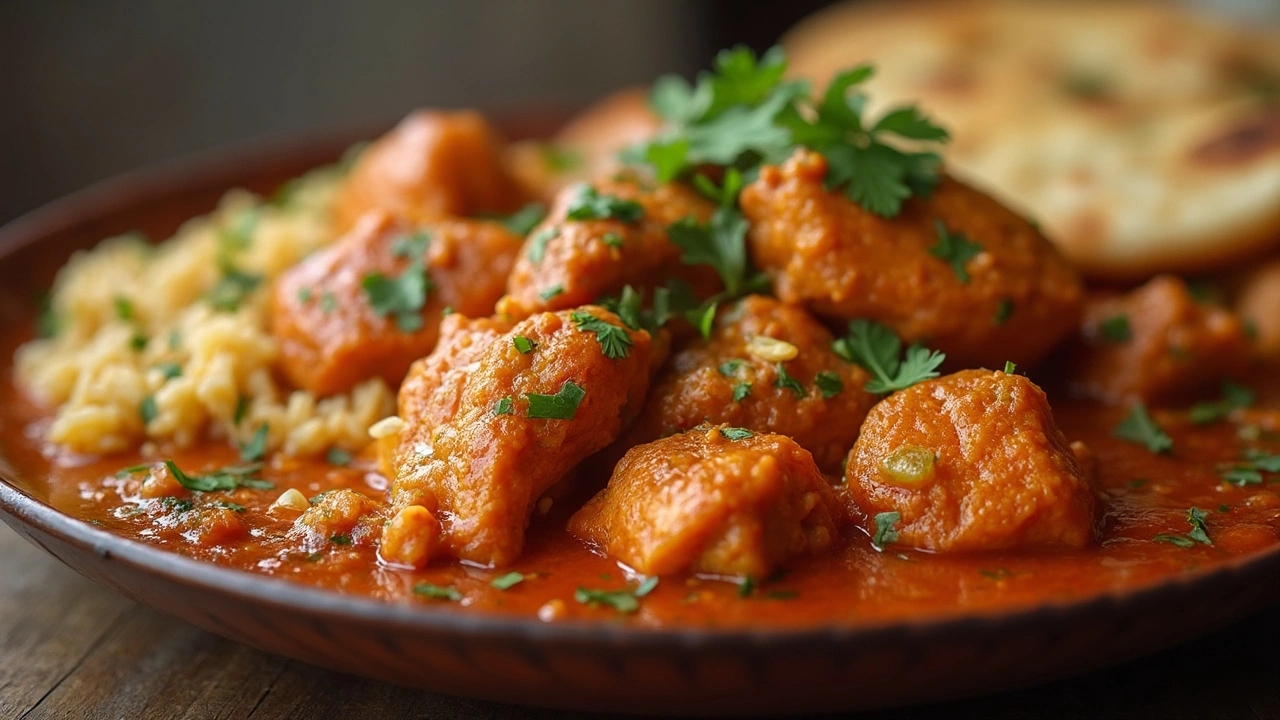Ever been annoyed when your chicken turns out rubbery in curry? It happens to the best of us! But there's a way to dodge that bullet, and it starts with picking the right chicken cut. Unlike breast meat, which tends to dry out quickly, chicken thighs are buzzing with flavor and stay juicy. Already this small tweak can make a huge difference.
Now, let's talk marinades. Sounds fancy, right? But it can be as simple as yogurt, lemon juice, and some spices. This combo does wonders, breaking down the meat fibers, so every bite is a tender delight. Toss your chicken in it and let it sit, even if it’s just for half an hour while you prep everything else.
- Choosing the Right Cut
- The Magic of Marinades
- Cooking Techniques for Tenderness
- Common Mistakes to Avoid
Choosing the Right Cut
When it comes to crafting that perfect tender chicken curry, the first secret weapon is choosing the best cut of chicken. Many people often default to chicken breast out of habit, but if you’re after maximum juiciness and flavor, chicken thighs are where it’s at. They have more fat, which means more flavor—and who doesn’t want that?
Now, let’s break down why this matters. Chicken thighs, whether bone-in or boneless, have a higher fat content. This keeps them moist during cooking, especially in dishes that simmer for a while like curry. Simmering actually allows thighs to get even more tender, unlike breasts that tend to dry out.
Here are some quick tips for choosing the right cut:
- Bone-in Thighs: Great for long-simmering curries. Bones add flavor and help retain moisture.
- Boneless Thighs: Perfect if you want to skip the bones but still keep it juicy. Easier to eat and quicker to cook.
- Skin-On Thighs: If possible, these add another layer of richness to your dish. You can remove the skin before serving if you prefer.
If you really love your chicken curry and are ready to explore even more options, give drumsticks or leg quarters a try. They’re equally flavorful, often cheaper, and pack a punch with their own unique taste and texture profiles.
Pay attention to these choices, and you’re already halfway to making a mouth-watering chicken curry that’s anything but dry!
The Magic of Marinades
Alright, let’s dive into why marinades are literally magic for getting tender chicken in your curry. It's not just tossing your chicken in any old sauce; it's about choosing the right ingredients that will transform your meat into something extraordinary.
Marinades do two main things: they infuse flavor and break down proteins. The acid in ingredients like yogurt, lemon juice, or vinegar starts working on the meat, making it softer. Ever wonder why Indian curries often use yogurt? It’s because it's a double agent, tenderizing the chicken while also adding a rich tangy flavor.
Here's a simple breakdown of a go-to marinade for a chicken curry recipe: yogurt, a squeeze of lemon juice, minced garlic, ginger, and spices like cumin or coriander. This combination doesn’t just soften the chicken; it also acts as a flavor bomb, taking your curry to another level.
Let’s talk time. While you can get away with a quick 30-minute soak, leaving the chicken to marinate for a couple of hours or overnight in the fridge really seals the deal on tenderness. But who’s got time for that every day? Maybe reserve those overnight marinades for when you really want to impress.
Considering skipping this step? Think again. This simple preparation can be the secret between a dry, chewy disaster and a succulent, juicy masterpiece. Want to make sure you're always on top? Keep a basic marinade ready in the fridge so you’re ready to whip up a midweek miracle.

Cooking Techniques for Tenderness
Getting that juicy chicken in your curry isn't just about the ingredients; it's how you cook them too. So, let's get into some techniques that'll make sure your chicken is melt-in-your-mouth tender.
First up, low and slow is the way to go. Cooking your curry at a gentle simmer—not a full boil—allows the chicken to stay moist. Bring your curry to a boil and then reduce the heat. Patience is key, so let it simmer away until the chicken is cooked through but still tender.
Here's a neat trick: brine your chicken before it hits the pan. A simple saltwater solution can help the chicken retain moisture. Just dissolve salt in water, drop the chicken in for about 15 to 30 minutes, then rinse it off before cooking. It's surprisingly effective!
While we're on the topic of moisture, always cover your pot with a lid. This traps steam and keeps everything nice and juicy.
Ever thought of a pressure cooker? This little gadget can save you loads of time while ensuring that your chicken gets ultra-tender. Just remember to add enough liquid, and manage the cooking time carefully to avoid overcooking.
- Simmer don’t boil: Keep the heat low.
- Brine for moisture retention.
- Use a lid: Trap that steam.
- Try a pressure cooker for speed and tenderness.
If you're more of a numbers person, try cooking your chicken to an internal temperature of about 75°C (165°F). Invest in a meat thermometer—it takes the guesswork out and guarantees you won't end up with dry or undercooked chicken.
Remember, the end goal is tender chicken that's soaked up all those spices and flavors to give your curry a delicious punch. Keep these tips in mind, and you'll be that person everyone goes to for curry advice!
Common Mistakes to Avoid
Alright, so how do you keep your chicken from turning into curry rubber? There are a few common traps folks fall into, especially if you're new to the chicken curry game. Let's make sure you dodge them like a pro.
First off, ever tried to cook your chicken straight out of the fridge? Big no-no! Cold chicken hits the hot pan and boom, it seizes up and gets tough. Let that chicken rest at room temperature for about 20-30 minutes before cooking. It relaxes the meat, making it cook more evenly.
Another thing: cooking chicken for too long. This happens a lot when you're worried about whether it's done. In curry, you want to simmer it just until it's cooked through, then let the residual heat do the rest. Overcooking is like asking for chewy chicken.
Keep an eye on your spice timing as well. Adding spices too late can lead to them tasting raw and overpowering the dish. Fry them lightly before you add your chicken to unlock their flavors. Trust me, your taste buds will thank you.
- Marinate properly: Ever used old meat or didn't soak long enough? Give it some time! It's like magic for keeping it juicy.
- Check your heat settings: Has your stove been on full blast? Lower heat for more even cooking.
- Not tasting as you go: If you're not tasting, you might miss when the seasoning's just right.
No one wants their curry wrecked by tough meat. Stick to these tips, and your curry will be the star of any meal.
